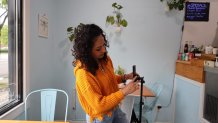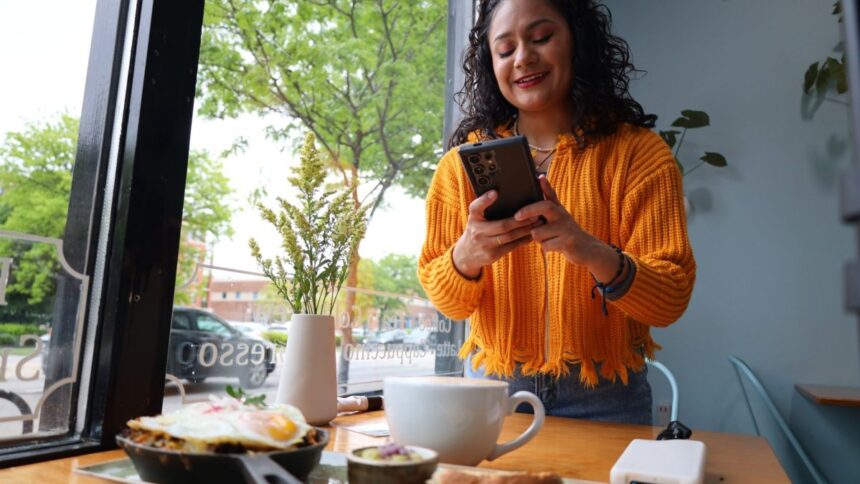Rocío Villalva became inspired to create her own social media content by YouTubers who travel around the world. She hoped to live that life herself one day. But, she was hesitant to build her online presence and create a brand as an influencer because she is undocumented.
“I always felt that I wanted to create something…So I was like, ‘You know what? This doesn’t have to stop me.’ I can do it in my neighborhood, in my city or even travel in different states,” said Villava, who is protected from deportation and receives a work permit under DACA, the Obama-era Deferred Action for Childhood Arrivals.
This prompted Villalva to create her own brand, Chido Chicago, and become a “DACA Latina Influencer,” she said. She now has over 30,000 Facebook followers, over 21,000 Instagram followers and over 13,000 followers on TikTok.
Her content mostly consists of touring the city of Chicago and highlighting events or restaurants that she finds interesting. While Villalva promotes mainstream events in the city, she also makes an effort to highlight small Latine-owned businesses.
When she was first growing her following, Villalva visited the coffee shop Dulce de Leche Cafecito in Irving Park. She asked the shop owner, Omar Contreras, if she could film a promotional video to share the restaurant with her followers.
Contreras first opened his business in 2020 in the midst of the pandemic. He said Villalva helped him expand his clientele through her social media following during difficult financial times for small businesses.
Villalva’s video was his “lucky kick,” Contreras said. People from all over the city came into his coffee shop and told him they saw his food on the Chido Chicago instagram page.
“It was a really big impact in my business to grow and to expose us,” Contreras said. “During the pandemic, I didn’t have the opportunity to do marketing for people to come into my restaurant to try the food until she did the video. So people started coming in and then going out to tell others how good it was.”
Contreras’s success inspired Villalva to promote other small businesses across the city.
“When I saw what I was able to do for his business, it was amazing,” Villalva said. “He’s also helping the community, and other businesses also help the community a lot….That pushed me to keep going.”
Villalva said that promoting Latine-owned small businesses and helping them to grow their clientele is her “form of activism.”
She said she is no longer afraid of social media exposure because of her status. But that’s unusual for most undocumented people.
Stephanie Alejandra Ortega, a legal supervisor at Kempster, Corcoran, Quiceno and Lenz-Calvo immigration law office, says DACA recipients — or those applying for DACA status — often refrain from participating in activism through social media because it may have a negative impact on their case.
“Immigration law is extremely complex, and things posted on the internet, even privately, can come to haunt folks,” Ortega said. “Anyone who engages in calls to action, calls for systemic change or activism online, should have an immigration attorney or DOJ Accredited Representative assess their case and advise them any time they are applying.”
Though participating in activism through social media may only have a negative impact if linked to anything that can be considered criminal activity, Ortega said.
But those promoting Latine-owned businesses through social media, like Villalva, play an important role in the community because they can speak to “the difficulties of establishing entrepreneurship” given all of the obstacles that many immigrant Latinos face, Ortega said.
“DACA folks — and undocumented folks in general — should be able to take up space and be visible on social media supporting their community,” she said. “It makes such a huge difference for people to see someone who is like them doing something that is positive for the community.”
Villalva says she sees her brand as an inclusive platform where she can support and inspire the Latine community in Chicago, while also helping them feel accepted.

“I tell people that sometimes it’s not waiting to be accepted by others but accepting yourself… that you belong here,” Villalva said. “You deserve to feel at home because this is your place and this is where you are right now.”
She makes an effort to promote a variety of businesses across Chicago, beyond those in Latine communities. She said she wants to make exploring the city more accessible for her largely Latine and Chicago-based following.
“Being an immigrant or being a visitor in another country, sometimes you feel left out. If you see that everything is in English, you feel like it’s not for you,” Villalva said. “If they [her followers] see that in Spanish, and they also see me going to those events, that makes them feel like ‘oh I can go there’…. It’s like an invitation.”
Villalva’s close friend, Javier Ocampo, who died in 2018, encouraged her to create her brand. She honors his memory by encouraging her followers to not be afraid to try things that interest them and to create their own content.
“Just start making content. It doesn’t matter if you have an idea. You just start making content because you don’t know who’s watching. You don’t know who actually is liking what you do or it’s getting a benefit,” Villalva said.










